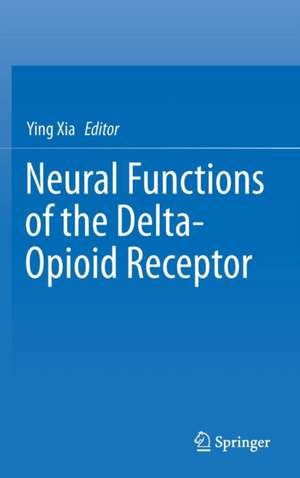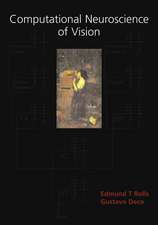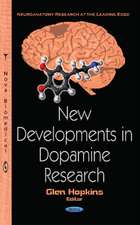Neural Functions of the Delta-Opioid Receptor
Editat de Ying Xiaen Limba Engleză Hardback – 7 ian 2016
| Toate formatele și edițiile | Preț | Express |
|---|---|---|
| Paperback (1) | 963.77 lei 6-8 săpt. | |
| Springer International Publishing – 30 mar 2018 | 963.77 lei 6-8 săpt. | |
| Hardback (1) | 1123.87 lei 6-8 săpt. | |
| Springer International Publishing – 7 ian 2016 | 1123.87 lei 6-8 săpt. |
Preț: 1123.87 lei
Preț vechi: 1183.01 lei
-5% Nou
Puncte Express: 1686
Preț estimativ în valută:
215.07€ • 223.27$ • 179.34£
215.07€ • 223.27$ • 179.34£
Carte tipărită la comandă
Livrare economică 25 martie-08 aprilie
Preluare comenzi: 021 569.72.76
Specificații
ISBN-13: 9783319254937
ISBN-10: 3319254936
Pagini: 685
Ilustrații: XV, 685 p. 61 illus., 38 illus. in color.
Dimensiuni: 155 x 235 x 38 mm
Greutate: 1.15 kg
Ediția:1st ed. 2015
Editura: Springer International Publishing
Colecția Springer
Locul publicării:Cham, Switzerland
ISBN-10: 3319254936
Pagini: 685
Ilustrații: XV, 685 p. 61 illus., 38 illus. in color.
Dimensiuni: 155 x 235 x 38 mm
Greutate: 1.15 kg
Ediția:1st ed. 2015
Editura: Springer International Publishing
Colecția Springer
Locul publicării:Cham, Switzerland
Cuprins
Preface.- Current research on the δ-opioid receptor: From neuroprotection against hypoxia/ischemia to broad neural functions.- Recent history on delta opioid receptors and ligands: Biased mechanisms, and opioid delta-mu and delta-kappa receptor heteromers.- Evolutionary distribution of the δ-Opioid Receptor: from invertebrates to humans.- Developmental distribution of the δ-opioid receptor in mammalian brains.- The Role of δ-opioid receptors in brain ionic homeostasis under physiological condition.- The δ-opioid receptor and stabilization of brain ionic homeostasis in hypoxia/ischemia.- Regulation of membrane transporters by delta-opioid receptors.- Neuroprotective interactions between delta-opioid receptors and glutamatergic signaling mediate hypoxia-tolerance in brain.- δ-Opioids and Neurogenesis.- Delta Opioid Receptor and Peptide: Hibernation for Stroke Therapy.- An important role of the δ-opioid receptor in electroacupuncture-induced protection against ischemic brain injury.- Delta Opioid Receptor in Cerebral Preconditioning.- Delta-opioid receptor-mediated protection and mitochondria.- The delta-opioid system in the brain: A neglected element in Parkinson’s disease?.- Are δ-opioid receptors involved in deep brain stimulation?.- Acupuncture, opioid receptors and Na+ channels: A novel insight into inhibition of epileptic hyperexcitability.- Delta Opioids in Protection of the Heart and Brain.- The Various Functions of Opioids in Pathophysiological Conditions.
Recenzii
“Recent development in research dedicated to the function of δ-opioid receptors (DORs) is reviewed in this book. … Book may serve for graduated as well as undergraduated students who wish to get better insight into topics covered by individual chapters. It will be indispensable reference book for scientists working on any aspect of opioid research.” (Lubica Lacinova, General Physiology and Biophysics, Vol. 35 (4), 2016)
Notă biografică
Dr. Ying Xia is Professor and Vice-Chairman for Research of the Department of Neurosurgery at The University of Texas Medical School at Houston, and Professor of Neuroscience at The University of Texas at Houston Graduate School of Biomedical Sciences. He obtained his medical training at Soochow Medical College, China and his Master Degree of Medicine and Doctoral Degree of Medical Science (Ph.D.) in Neurobiology and Integrative Medicine at Shanghai Medical University, China. Dr. Xia joined Yale University School of Medicine for his postdoctoral training and established his laboratory at Yale. During his 22-year academic career at Yale University School of Medicine, he was appointed as a faculty member in 1993 and promoted to Associate Professor in 2002. He joined the University of Texas Medical School at Houston in May 2010.
Dr. Xia’s research has been consecutively supported by various funding agencies such as NIH, America Heart Association, March of Dimes Foundation, Cerebral Palsy Foundation and The Vivian L. Smith Neurologic Foundation since the establishment of his laboratory. He has been invited to deliver speeches by many academic institutions and international conferences. He is a reviewer for many international journals and serves as a grant reviewer for NIH, US National Science Foundation, other American and European foundations, Hong Kong University Grants Committees, and Natural Science Foundation of China.
Dr. Xia’s research has been consecutively supported by various funding agencies such as NIH, America Heart Association, March of Dimes Foundation, Cerebral Palsy Foundation and The Vivian L. Smith Neurologic Foundation since the establishment of his laboratory. He has been invited to deliver speeches by many academic institutions and international conferences. He is a reviewer for many international journals and serves as a grant reviewer for NIH, US National Science Foundation, other American and European foundations, Hong Kong University Grants Committees, and Natural Science Foundation of China.
Textul de pe ultima copertă
This is the first book to summarize the progress of research on the delta opioid receptor (DOR) to date. This receptor, a member of the opioid receptor family, was not studied at all until the 1990s when some researchers began looking into the role that it plays in neuroprotection and other functions. Many scientists from a number of independent labs have now confirmed that DOR can provide neuroprotection from hypoxic/ischemic injuries. They have also found that it plays a role in physiological and pathophysiological events such as hypoxic encephalopathy, epilepsy, acupuncture, Parkinson's disease, etc. by regulating membrane proteins and balancing intracellular survival/death signals. The book provides a comprehensive overview of the current state of research and provide a blueprint for future directions.
Caracteristici
The first book to provide a comprehensive overview on neural functions of the Delta Opioid Receptor
Includes contributions from major DOR researchers in the world
Covers the topic from cellular aspects to clinical potentials?
Includes contributions from major DOR researchers in the world
Covers the topic from cellular aspects to clinical potentials?
















